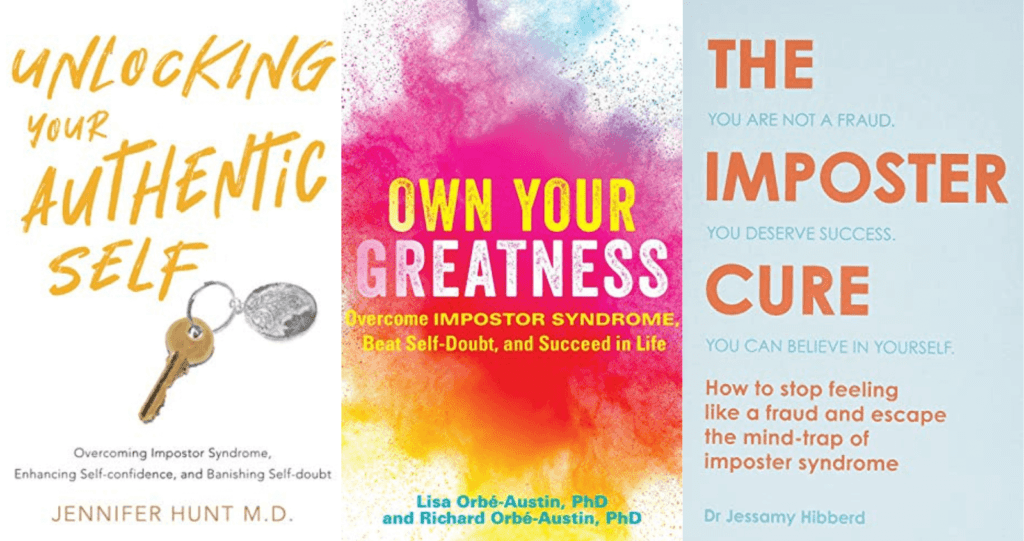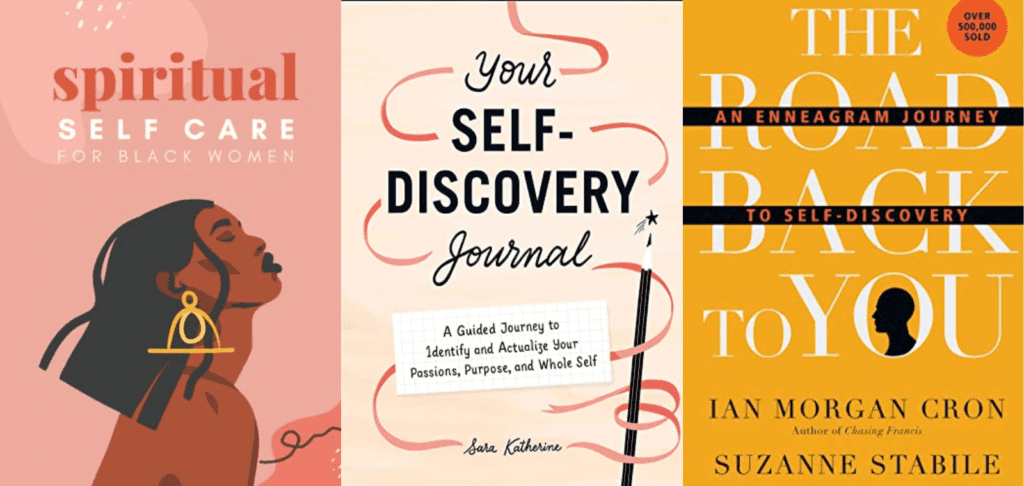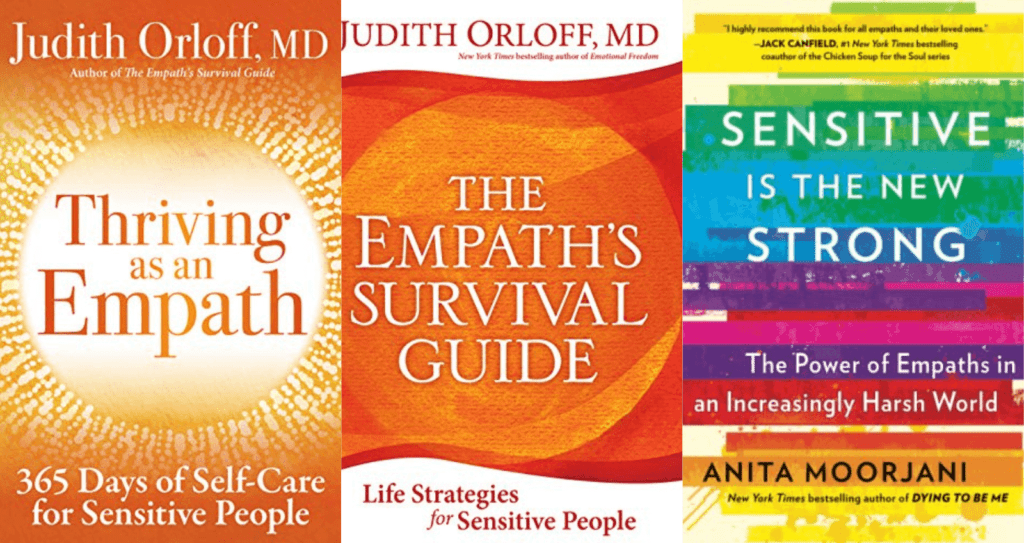The following are books about imposter syndrome to help you embark on your recovery journey.
- What Is Imposter Syndrome?
- Books About Imposter Syndrome
- 1. Unlocking Your Authentic Self
- 2. The Secret Thoughts of Successful Women
- 3. The Imposter Cure
- 4. The Confidence Code
- 5. Get Out of Your Own Way
- 6. Your Unstoppable Greatness
- 7. Overcoming Imposter Syndrome: for Healers & Helpers
- 8. Yes! You Are Good Enough
- 9. Why Do I Feel Like an Imposter?
- 10. The Imposter Syndrome Remedy
- 11. Rethink Imposter Syndrome
- 12. Ditching Imposter Syndrome
- Workbooks About Imposter Syndrome
- How Books About Imposter Syndrome Can Help
- Conclusion
Disclosure: Some of the links below are affiliate links. This means that, at zero cost to you, I will earn an affiliate commission if you click through the link and finalize a purchase.
What Is Imposter Syndrome?
Imposter syndrome refers to a psychological pattern in which an individual doubts their accomplishments and has a persistent fear of being exposed as a fraud.
People who experience imposter syndrome often believe that they are not as competent or talented as others perceive them to be, attributing their achievements to luck or external factors rather than their own abilities.
This can result in feelings of self-doubt, anxiety, and a constant need to prove oneself.
Imposter syndrome can affect individuals from all walks of life, including high-achieving professionals, students, artists, and more.
It’s important to remember that imposter syndrome is not based on reality, but rather on distorted perceptions of oneself.
Books About Imposter Syndrome
1. Unlocking Your Authentic Self
By Jennifer L Hunt

“Unlocking Your Authentic Self” by Jennifer L. Hunt is an insightful and empowering guide to help you discover and embrace your true self. In a world where societal expectations can often cloud our judgment and hinder personal growth, this book offers a roadmap to break free from those limitations and live authentically.
Through her gentle and patient approach, Jennifer L. Hunt provides practical tools, exercises, and guidance to help you explore your values, passions, and unique talents. She emphasizes the importance of self-reflection and self-awareness as pathways to unlocking your authentic self. With each chapter, you will gain a deeper understanding of who you truly are and what truly matters to you.
Related: Best 11 Exercises To Help You Beat Imposter Syndrome (+FREE Worksheets)
2. The Secret Thoughts of Successful Women
By Valerie Young

“The Secret Thoughts of Successful Women” by Valerie Young is a thought-provoking and empowering book that dives deep into the inner world of accomplished women. With grace and empathy, Young explores the often-hidden thoughts and fears that highly successful women grapple with, offering a fresh perspective on what it truly means to be successful.
Drawing on her own experiences, as well as extensive research and interviews, Young skillfully uncovers the imposter syndrome – the feeling of being undeserving or fraudulent despite notable achievements – that many women face. Through this exploration, she demonstrates that imposter syndrome is not a sign of weakness, but rather a testament to the high standards and ambitions that women hold themselves to.
In “The Secret Thoughts of Successful Women,” Young provides readers with practical strategies and guidance for overcoming imposter syndrome and embracing their achievements fully. She offers steps to recognize and challenge negative self-talk, cultivate self-compassion, and build resilience.
Related: Top 21 Affirmations For Imposter Syndrome (+FREE Worksheets)
3. The Imposter Cure
By Dr. Jessamy Hibberd

The Imposter Cure by Dr. Jessamy Hibberd is a thought-provoking and empowering book that examines the phenomenon of imposter syndrome and offers practical strategies to overcome it. With her gentle and supportive tone, Dr. Hibberd guides readers through the complex emotions and self-doubt often associated with feeling like a fraud.
Throughout the book, Dr. Hibberd provides a deep understanding of the psychology behind imposter syndrome, debunking common myths and shedding light on its prevalence across various walks of life.
Drawing on her extensive expertise as a clinical psychologist, she offers insightful anecdotes, case studies, and relatable examples to help readers recognize their own experiences and navigate through their insecurities.
Related: Top 52 Quotes About Imposter Syndrome
4. The Confidence Code
By Katty Kay, Claire Shipman

In “The Confidence Code”, authors Katty Kay and Claire Shipman explore the concept of confidence and why women often struggle with it.
Through scientific research and personal anecdotes, the authors reveal the importance of confidence in achieving success, and the ways in which women can cultivate and harness their own self-assurance.
The book delves into the psychological and cultural factors that contribute to the confidence gap between men and women, and offers practical tips and strategies for building confidence in various areas of life, from the workplace to personal relationships.
Related: Best +25 Affirmations For Self Doubt
5. Get Out of Your Own Way
By Mark Goulston, Philip Goldberg

“Get Out of Your Own Way” is a practical and insightful guide to overcoming self-defeating behavior.
Written by Mark Goulston and Philip Goldberg, this book offers powerful strategies for identifying the thoughts, emotions, and behaviors that are holding you back, and provides clear steps for breaking free from negative patterns.
Whether you struggle with procrastination, self-doubt, fear, or any other self-defeating habit, this book will help you gain the self-awareness and confidence you need to achieve your goals and live a happier, more fulfilling life.
Related: CBT Worksheets Bundle (FREE PFD Download)
6. Your Unstoppable Greatness
By Lisa Orbé-Austin PhD, Richard Orbé-Austin PhD

“Your Unstoppable Greatness” is an insightful and practical guide to overcoming self-doubt, cultivating agency, and achieving ultimate career goals.
Written by renowned psychologists Lisa Orbé-Austin and Richard Orbé-Austin PhD, this book offers a powerful message of encouragement and empowerment to readers who may be struggling with feelings of impostor syndrome or self-limiting beliefs.
Through personal anecdotes, relatable case studies, and cutting-edge research, the authors offer a step-by-step roadmap for breaking free from the mental and emotional barriers that may be holding readers back from reaching their full potential.
They provide actionable strategies for developing a growth mindset, building resilience, and embracing vulnerability as a key to personal and professional growth.
Related: Negative Core Beliefs List (& 8 Tips On How To Challenge Them)
7. Overcoming Imposter Syndrome: for Healers & Helpers
By Jim LaPierre LCSW, CCS

In “Overcoming Imposter Syndrome: for Healers & Helpers,” acclaimed author Jim LaPierre LCSW, CCS offers a compassionate and insightful guide to conquer the challenges of imposter syndrome specifically tailored for those in healing professions.
Imposter syndrome, a common experience among healers and helpers, is a psychological pattern characterized by self-doubt, fear of being exposed as a fraud, and a persistent belief that one’s accomplishments are undeserved. Drawing from his extensive experience in the field, LaPierre skillfully addresses these deeply ingrained insecurities and provides practical strategies to break free from the cycle.
With a gentle and patient approach, LaPierre offers understanding and validation to healing professionals who may feel overwhelmed by their internal struggles. Through a combination of personal anecdotes, case studies, and evidence-based techniques, he guides readers on a transformative journey towards self-acceptance and true confidence.
Related: How To Feel Your Feelings? Top 9 Difficult Emotions To Cope With In Healthy Ways
8. Yes! You Are Good Enough
By Trish Taylor

In “Yes! You Are Good Enough: End Imposter Syndrome, Overthinking and Perfectionism and Do What YOU Want,” author Trish Taylor guides readers on a transformative journey towards self-acceptance, self-empowerment, and authenticity.
Are you constantly doubting your abilities? Do you find yourself trapped in the cycle of overthinking and perfectionism? Do you feel like an imposter despite evidence of your accomplishments? If so, this book is for you.
With her gentle and patient approach, Taylor helps readers understand the root causes of imposter syndrome, overthinking, and perfectionism. She provides practical tools and techniques to overcome these destructive patterns and replace them with healthier habits and thought patterns.
Through relatable anecdotes, insightful exercises, and expert guidance, Taylor empowers readers to break free from the self-defeating beliefs that hold them back. She encourages readers to embrace their unique strengths, celebrate their achievements, and cultivate self-compassion.
Related: Best 35 Journal Prompts To Get To Know Yourself
9. Why Do I Feel Like an Imposter?
By Dr. Sandi Mann

Why Do I Feel Like an Imposter?: How to Understand and Cope with Imposter Syndrome is a compassionate and insightful guide written by esteemed psychologist, Dr. Sandi Mann. In this illuminating paperback, Dr. Mann explores the pervasive phenomenon known as imposter syndrome and presents practical strategies for overcoming its challenges.
Imposter syndrome is a psychological phenomenon that affects countless individuals, often leaving them feeling like frauds despite their accomplishments. Through a combination of research, case studies, and personal anecdotes, Dr. Mann provides a comprehensive understanding of imposter syndrome and its profound impact on self-esteem and overall well-being.
With a gentle and friendly tone, Dr. Mann guides readers through the various manifestations of imposter syndrome and delves into the root causes behind these feelings of inadequacy, unworthiness, and self-doubt. She emphasizes the importance of recognizing and acknowledging these emotions as a crucial step toward healing and personal growth.
The book offers practical techniques and exercises that help readers develop resilience, confidence, and a more positive self-image. Dr. Mann’s evidence-based strategies provide valuable tools to challenge negative self-talk, manage anxiety, and build self-compassion. Additionally, she addresses how imposter syndrome can affect relationships, career choices, and mental health, offering invaluable guidance on navigating these challenges.
Related: Top 25 Self Reflection Journal Prompts
10. The Imposter Syndrome Remedy
By Dr E V Estacio PhD

In “The Imposter Syndrome Remedy,” Dr E V Estacio PhD provides a 30-day action plan to help you stop feeling like a fraud and start flourishing at work and in life.
Using the PAME Code, Dr Estacio will help you end self-sabotage, know your worth, and overcome imposter syndrome once and for all. This helpful and practical guide includes exercises, case studies, and real-world examples to help you understand and overcome imposter syndrome.
Related: Top 10 Ways To Stop Wallowing In Self Pity
11. Rethink Imposter Syndrome
By Vinita Bansal

Rethink Imposter Syndrome: Build Confidence, Beat Self-Doubt, and Succeed is a powerful guide that offers practical strategies and insights to overcome the pervasive issue of imposter syndrome. Written by Vinita Bansal, a renowned expert in the field, this paperback edition provides readers with the tools they need to cultivate self-assurance and achieve their goals.
In this book, Bansal compassionately addresses the struggles many individuals face when navigating feelings of inadequacy and unworthiness. Drawing from her own experiences and extensive research, she delves into the root causes of imposter syndrome and unravels its detrimental effects on personal growth and career advancement. With a gentle and empathetic tone, Bansal guides readers through a transformative journey towards self-discovery and self-acceptance.
The practical techniques and exercises presented in this book serve as stepping stones for developing confidence and resilience. From reframing negative self-talk to embracing vulnerability, Bansal equips readers with actionable strategies that can be implemented immediately.
Moreover, she emphasizes the importance of cultivating a support network and seeking mentorship, providing readers with invaluable advice on building meaningful connections that promote growth and success.
Related: Best 20 Tips On How To Let Go Of Perfectionism
12. Ditching Imposter Syndrome
By Clare Josa

In “Ditching Imposter Syndrome,” author Clare Josa offers a compassionate and practical guide to overcoming the debilitating self-doubt that plagues many individuals. With her gentle and encouraging approach, Josa provides readers with insightful strategies and effective tools to conquer the impostor syndrome, allowing them to reclaim their confidence and step into their true potential.
In this transformative hardcover book, Josa takes readers on a journey of self-discovery and empowerment. Drawing on her experience as a mindset mentor and leadership trainer, she unravels the complexity of imposter syndrome with clarity and compassion. She explores the various factors that contribute to this phenomenon, such as fear of failure, perfectionism, and comparison to others.
Through personal anecdotes, case studies, and practical exercises, Josa guides readers towards understanding the root causes of their own imposter syndrome and provides actionable steps to overcome it.
She addresses common challenges faced by individuals, including feelings of not being ‘good enough,’ struggling with self-worth, and constantly seeking validation from others.
Related: Top 10 Books About Perfectionism
Workbooks About Imposter Syndrome
13. Own Your Greatness
By Dr. Lisa Orbé-Austin, Dr. Richard Orbé-Austin

Own Your Greatness is a powerful and transformative book written by Dr. Lisa Orbé-Austin and Dr. Richard Orbé-Austin. It is designed to guide readers on a journey towards self-discovery, empowerment, and personal growth.
In this book, the authors draw upon their extensive experience as psychologists to provide valuable insights and practical strategies for individuals seeking to tap into their true potential. They emphasize the importance of embracing one’s unique strengths, talents, and achievements, while also acknowledging and addressing the barriers that may be holding them back.
Dr. Lisa and Dr. Richard approach the topic with a deep understanding and empathy, creating a safe space for readers to explore their fears, insecurities, and self-doubt. Through relatable stories, engaging exercises, and thought-provoking questions, they help readers uncover their hidden passions, dreams, and goals.
Related: Root Cause Of Perfectionism (top 5 Causes)
14. The Imposter Syndrome Workbook
By Athina Danilo LMFT

“The Imposter Syndrome Workbook” by Athina Danilo LMFT is a practical guide designed to help individuals overcome their self-doubt and imposter syndrome. The book offers various exercises, activities and techniques that allow readers to explore the root causes of their imposter syndrome and develop strategies to overcome it.
The workbook covers a wide range of topics, such as identifying negative thought patterns, building self-confidence, setting achievable goals, and managing anxiety. It also includes real-life examples and case studies that provide readers with relatable scenarios and effective solutions.
Throughout the book, Athina Danilo LMFT adopts an empathetic and encouraging tone, offering support and guidance to readers every step of the way.

How Books About Imposter Syndrome Can Help
Books about imposter syndrome can be incredibly helpful in several ways. Here are a few ways these books can benefit you:
1. Understanding the phenomenon: Books about imposter syndrome help you gain a deeper understanding of what it is and how it manifests. By learning about the common signs, causes, and factors that contribute to imposter syndrome, you can begin to recognize it in yourself or others.
2. Normalizing your experiences: Reading about imposter syndrome can help you realize that you are not alone in feeling this way. These books often include stories from individuals who have experienced imposter syndrome, showing you that even successful people struggle with self-doubt.
3. Self-reflection and identification: Books often provide exercises and prompts for self-reflection that allow you to identify and acknowledge your own imposter syndrome patterns. This self-awareness is crucial in overcoming imposter syndrome and developing self-confidence.
4. Coping strategies: Books on imposter syndrome offer practical advice and coping strategies to help you navigate through these feelings. Through techniques like reframing negative self-talk, cultivating self-compassion, and seeking support, you can develop healthier ways of managing imposter syndrome.
5. Building resilience: Many books emphasize the importance of embracing failure, learning from setbacks, and building resilience. They can teach you how to overcome self-limiting beliefs and take action in spite of imposter feelings, ultimately helping you reach your full potential.
Conclusion
Reading books about imposter syndrome is just one tool in your journey to overcoming it.
It’s important to combine this knowledge with patience, self-compassion, and seeking support from loved ones or professionals if needed.



